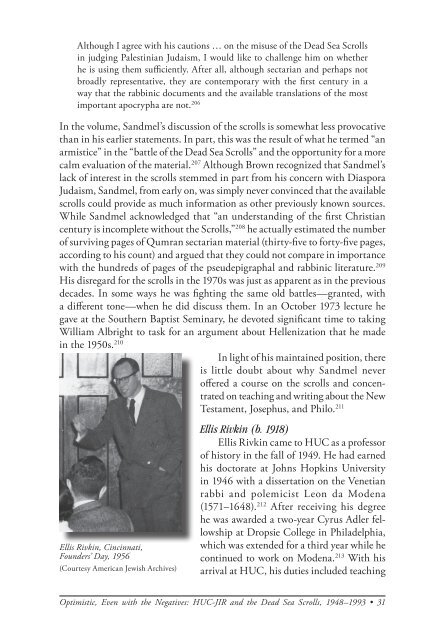The American Jewish Archives Journal, Volume LXI 2009, Number 1
The American Jewish Archives Journal, Volume LXI 2009, Number 1
The American Jewish Archives Journal, Volume LXI 2009, Number 1
Create successful ePaper yourself
Turn your PDF publications into a flip-book with our unique Google optimized e-Paper software.
Although I agree with his cautions … on the misuse of the Dead Sea Scrolls<br />
in judging Palestinian Judaism, I would like to challenge him on whether<br />
he is using them sufficiently. After all, although sectarian and perhaps not<br />
broadly representative, they are contemporary with the first century in a<br />
way that the rabbinic documents and the available translations of the most<br />
important apocrypha are not. 206<br />
In the volume, Sandmel’s discussion of the scrolls is somewhat less provocative<br />
than in his earlier statements. In part, this was the result of what he termed “an<br />
armistice” in the “battle of the Dead Sea Scrolls” and the opportunity for a more<br />
calm evaluation of the material. 207 Although Brown recognized that Sandmel’s<br />
lack of interest in the scrolls stemmed in part from his concern with Diaspora<br />
Judaism, Sandmel, from early on, was simply never convinced that the available<br />
scrolls could provide as much information as other previously known sources.<br />
While Sandmel acknowledged that “an understanding of the first Christian<br />
century is incomplete without the Scrolls,” 208 he actually estimated the number<br />
of surviving pages of Qumran sectarian material (thirty-five to forty-five pages,<br />
according to his count) and argued that they could not compare in importance<br />
with the hundreds of pages of the pseudepigraphal and rabbinic literature. 209<br />
His disregard for the scrolls in the 1970s was just as apparent as in the previous<br />
decades. In some ways he was fighting the same old battles—granted, with<br />
a different tone—when he did discuss them. In an October 1973 lecture he<br />
gave at the Southern Baptist Seminary, he devoted significant time to taking<br />
William Albright to task for an argument about Hellenization that he made<br />
in the 1950s. 210<br />
In light of his maintained position, there<br />
is little doubt about why Sandmel never<br />
offered a course on the scrolls and concentrated<br />
on teaching and writing about the New<br />
Testament, Josephus, and Philo. 211<br />
Ellis Rivkin, Cincinnati,<br />
Founders’ Day, 1956<br />
(Courtesy <strong>American</strong> <strong>Jewish</strong> <strong>Archives</strong>)<br />
Ellis Rivkin (b. 1918)<br />
Ellis Rivkin came to HUC as a professor<br />
of history in the fall of 1949. He had earned<br />
his doctorate at Johns Hopkins University<br />
in 1946 with a dissertation on the Venetian<br />
rabbi and polemicist Leon da Modena<br />
(1571–1648). 212 After receiving his degree<br />
he was awarded a two-year Cyrus Adler fellowship<br />
at Dropsie College in Philadelphia,<br />
which was extended for a third year while he<br />
continued to work on Modena. 213 With his<br />
arrival at HUC, his duties included teaching<br />
Optimistic, Even with the Negatives: HUC-JIR and the Dead Sea Scrolls, 1948–1993 • 31

















